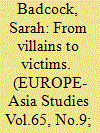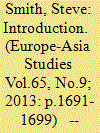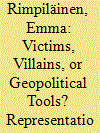| Srl | Item |
| 1 |
ID:
124305


|
|
|
|
|
| Publication |
2013.
|
| Summary/Abstract |
This essay presents the subjective experience of life and sickness for the punished in late Imperial Siberia, and the distinctions the punished made between legitimate and illegitimate forms of punishment. The essay also explores state policies towards the sick punished, and explores how different levels of the Tsarist administration and local Siberian society dealt with the challenge of sick and decrepit exiles. It argues that conditions in Siberian prisons were, in general, worse than those in European Russian prisons in the post-1906 period, and that the experience of exile in eastern Siberia placed it among the most difficult locations for exile. Though neither the state nor the punished regarded illness as an integral part of their punishment, the prevalence of illness and disease compounded the cruelty of sentences.
|
|
|
|
|
|
|
|
|
|
|
|
|
|
|
|
| 2 |
ID:
124300


|
|
|
|
|
| Publication |
2013.
|
| Summary/Abstract |
The essays in this collection focus in different ways on the ambiguities and paradoxes of 'villains' and 'victims' in late-Imperial Russia and the early Soviet Union. They derive from a conference on 'Villains and Victims: Justice, Violence and Retribution in Late-Imperial and Early Soviet Russia', which was organised by Sarah Badcock and took place at the University of Nottingham on 6-7 April 2010. The title of the conference had a certain alliterative charm, which is compounded by the fact that most of the essays in this collection also concern violence: violence being the terrain on which villains and victims tended to meet.
|
|
|
|
|
|
|
|
|
|
|
|
|
|
|
|
| 3 |
ID:
144236


|
|
|
|
|
| Summary/Abstract |
Pamphlets provide an overlooked corpus for understanding the demobilization of French soldiers in 1814 and 1815. Royalists particularly used the format to persuade combatants to return to civilian life, invoking the wartime suffering of French families to convince both soldiers and civilians to support an uneasy peace and a potentially unpopular ruler. Their writings reveal competing visions of the value and legacy of martial masculinity. Pamphleteers were torn between seeing soldiers as the quintessential victims or most enthusiastic agents of Napoleonic rule, and as wounded men ready for peace or as selfish and relentless warmongers incapable of domesticity.
|
|
|
|
|
|
|
|
|
|
|
|
|
|
|
|
| 4 |
ID:
171696


|
|
|
|
|
| Summary/Abstract |
This essay examines how the Ukrainian and Russian government-owned newspapers, Uriadovyi Kurier and Rossiiskaya Gazeta, represent people displaced by the war in Donbas, analysing the political goals revealed by these publications’ attitudes towards the displaced. While the Ukrainian publication delimits the nation by distinguishing ‘real’ internally displaced people (IDPs) deserving help and ‘fake’ IDPs guilty of siphoning Ukrainian taxpayers’ money to rebel-held areas, the Russian paper foregrounds the Russian state's competence in managing displacement while silencing the displaced themselves.
|
|
|
|
|
|
|
|
|
|
|
|
|
|
|
|